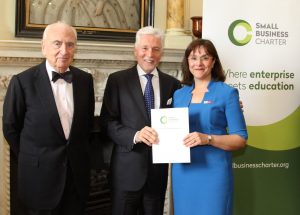
Salford Business School is celebrating after receiving the Small Business Charter Award at a special ceremony at 10 Downing Street, in recognition of the role it has played over the years in helping to kick-start British enterprise.
The Small Business Charter Award is a new scheme that recognises the great success achieved by British business schools in terms of their engagement with small and medium sized enterprises.
Salford Business School’s award demonstrates the confidence that the School has in its engagement with Small and Medium Sized Enterprises (SMEs) and the support it provides to students in terms of developing their employability as well as ambitions to become entrepreneurs and start their own business.
What is the Small Business Charter Award and what does this mean for Salford Business School?
Business schools recognised by the Small Business Charter have directly helped over 8,000 small businesses by working with them through workshops, mentoring and offering other business support through schemes such as Knowledge Transfer Partnerships. Over 800 new businesses have already been started as a result of activities undertaken by business schools which have been recognised on the 5th July 2014.
By receiving the award, Salford Business School has demonstrated exceptional dedication to supporting the small business community. The assessment process involved a external panel visit which included two academics and a small business representative who assessed Salford Business School on 30 engagement criteria.
Small Business Charter Award: benefits to Salford Business School
The award brings significant benefits to Salford Business School as it will have the ability to play an active role in schemes such as Growth Vouchers, Growth Accelerators and Start-Up Loans provided by the Government, meaning that the School can directly invest in new start-ups and entrepreneurs.
Professor Amanda Broderick, Dean of Salford Business School, received the Small Business Charter Award from Lord Young, an adviser to the Prime Minister on small business and enterprise, and Sir Peter Bonfield, Chair of The Small Business Charter Management Board and former chairman of BT.
The origins of the Small Business Charter Award

The Small Business Charter originated following Lord Young’s report ‘Growing Your Business’, which was aimed at bringing business schools, business and entrepreneurs closer together to deliver real change. Supported by the Association of Business Schools, Lord Young and the Department for Business, Innovation and Skills, the Small Business Charter Awards offers a springboard to unlocking support and investment for students, start-ups and small businesses. The Charter also follows the Association of Business Schools’ Innovation Taskforce report.
Professor Broderick said:
“I’m delighted that we’ve been recognised by the Department of Business, Innovation and Skills and the Association of Business Schools as an innovator in SME engagement and support.”
“Building on our national recognition as the top university in the North West and fifth in the UK for industry engagement, we are one of the first universities to be awarded the Small Business Charter to recognise the best practice of our engagement and support of the small business community.”
Congratulating the Small Business Charter Award winners for their trailblazing work, Lord Young, an adviser to the Prime Minister on small business and enterprise, said:
“The recipients of the award have all demonstrated exceptional dedication to improving links with and supporting small businesses in their local area, already creating over 800 jobs.”
“Our world-class universities and business schools are a key part of the UK economy – even more so as a result of this initiative. I hope that these awards will be the first of many and build on the outstanding work our business schools do to boost enterprise locally.”
Sir Peter Bonfield CBE FReng, Chair of the Small Business Charter Management Board, said:
“I am delighted to be involved with the Small Business Charter. This is an exciting initiative which recognises the value of small businesses. We have a tremendous opportunity to nurture innovation and enterprise and support the next generation of great British entrepreneurs.”
Work with Salford Business School

The University’s tight focus on the needs of SMEs means that we can be responsive to the challenges of innovating, particularly in a digitally connected, highly competitive environment.
Salford Business School is part of an academic community of 20,000 students from 100 countries, more than 1,000 academics, and research which is internationally recognised, is well positioned to help you deliver innovation beyond the ordinary constraints of your sector, and beyond the boundaries of the UK.
If you are interested in working with the award winning Salford Business School, please see what business services are on offer http://www.salford.ac.uk/business-school/business-services and get in-touch!